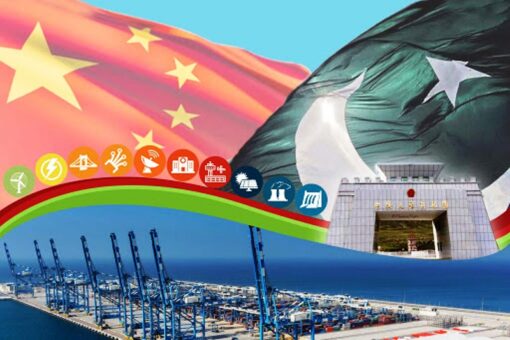Prime Minister Imran Khan convened a crucial meeting on Friday to assess the advancements in the China-Pakistan Economic Corridor (CPEC), a transformative economic initiative that has the potential to reshape the economic landscape of the region.
The meeting, held at the highest levels of government, aimed to set strategic targets for the short to mid-term phase of CPEC, focusing on collaboration in various sectors, including industry, socio-economics, agriculture, and the development of the port city of Gwadar.
Minister for Planning, Development, and Reform, Makhdum Khusro Bakhtyar, played a pivotal role during the meeting as he provided a comprehensive update on the outcomes of the 8th CPEC Joint Cooperation Committee meeting and the progress made on various CPEC projects. This marked a significant step in evaluating the ongoing initiatives and setting goals for the future.
One of the significant decisions made during the meeting was to designate the upcoming period as a phase of industrial cooperation, socio-economic development, and agriculture sector enhancement. In this context, timelines for the development of prioritized Special Economic Zones (SEZs) were finalized, with the aim of commencing groundbreaking activities in the first half of 2019.
Prime Minister Imran Khan emphasized the importance of fully utilizing the visits of Chinese investors this year. He highlighted the need to promote awareness among investors about Pakistan’s tax policies, align SEZs with the country’s development goals, and ensure a business-friendly environment to facilitate investments.
The meeting also underscored the necessity of preparing a timeline-based policy for the provision of utilities to SEZs at the earliest, ensuring that these zones are well-equipped to attract investments.
Furthermore, the government is keen to foster joint ventures in sectors such as petrochemicals, iron and steel, as well as food and agriculture. Prime Minister Khan instructed the relevant authorities to explore and develop opportunities in these fields in collaboration with Chinese partners.
To strengthen the connection between CPEC and the private sector, Prime Minister Imran Khan directed the establishment of a CPEC Business Advisory Council, consisting of prominent Pakistani business executives. This council will act as an interface between the government and the private sector, facilitating greater collaboration and investment in the corridor.
One of the key directions issued by the Prime Minister was the continued priority for the development of the Western Route of CPEC. This decision underscores the government’s commitment to ensuring that all regions of Pakistan benefit from this economic corridor.
Infrastructure development was also highlighted during the meeting as a matter of pragmatism and financial diligence. To this end, a high-level committee comprising the ministers for planning, railways, and finance was formed to finalize modalities for the Pakistan Railways ML-1 project, a crucial component of CPEC.
Additionally, Prime Minister Khan called for the formulation of a roadmap to promote the agriculture sector, inviting Chinese companies to explore investment opportunities in Pakistan and leverage the potential of agro value chains.
The meeting concluded with a vision for the development of Gwadar as a smart port city, transforming it into a transshipment and petrochemical hub. This strategic approach aims to maximize the potential of the Gwadar port, making it a vital node in CPEC’s extensive network.
In summary, the meeting chaired by Prime Minister Imran Khan has set ambitious targets and directions for the future of the China-Pakistan Economic Corridor. With a focus on industrial cooperation, socio-economic development, and agriculture, Pakistan is poised to capitalize on the immense potential that CPEC offers, driving the country toward a more prosperous and interconnected future. The government’s commitment to transparency, due diligence, and collaboration with the private sector underscores its determination to make CPEC a success story for Pakistan and the region.
